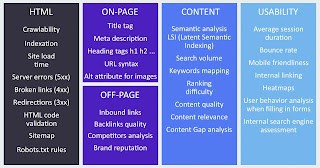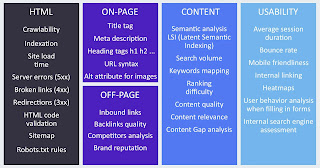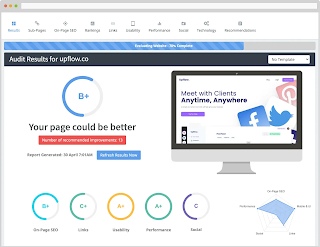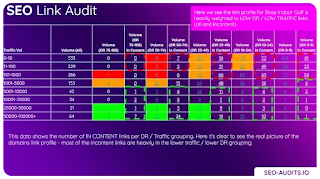SEO Audit: How to Optimize Your Website for Search Engines
Are you struggling to get traffic to your website? Is your website not ranking on the first page of search engine results? If so, you may need to perform an SEO audit. In this article, we will discuss what an SEO audit is, why it is important, and how you can perform one to optimize your website for search engines.
What is an SEO Audit?
An SEO audit is a process of analyzing your website to identify areas that need improvement to rank higher in search engine results. It involves evaluating your website's technical, on-page, and off-page factors that affect search engine visibility. An SEO audit is essential to identify potential issues and opportunities to improve your website's search engine optimization (SEO) performance.
Why is an SEO Audit Important?
An SEO audit helps you identify the strengths and weaknesses of your website's SEO performance. By conducting an SEO audit, you can:
- Identify technical issues that may hinder your website's crawlability and indexing.
- Evaluate your website's on-page factors such as content, meta tags, headings, and internal linking.
- Analyze your website's off-page factors such as backlinks, social media presence, and online reputation.
- Develop a comprehensive SEO strategy to improve your website's visibility, traffic, and conversion rates.
How to Perform an SEO Audit?
Performing an SEO audit involves several steps. Here are the essential steps you need to take to conduct a successful SEO audit:
1. Define Your Goals and Objectives
Before starting an SEO audit, it is crucial to define your goals and objectives. What do you want to achieve with your website? Do you want to increase traffic, generate leads, or boost sales? By defining your goals and objectives, you can align your SEO audit with your business objectives.
2. Conduct Keyword Research
Keyword research is a crucial step in SEO audit. It involves identifying the keywords and phrases that your target audience uses to search for your products or services. By conducting keyword research, you can identify the high-volume, low-competition keywords that you can target to improve your website's search engine visibility.
3. Evaluate Technical SEO Factors
Technical SEO involves optimizing your website's technical elements that affect search engine crawlability and indexing. It includes evaluating your website's:
- Site speed
- Mobile-friendliness
- URL structure
- XML sitemap
- Robots.txt file
- Canonical tags
- Schema markup
- HTTPS security
By evaluating these technical factors, you can identify any issues that may hinder your website's search engine performance.
4. Analyze On-Page SEO Factors
On-page SEO factors refer to the elements on your web pages that affect search engine visibility. It includes evaluating your website's:
- Content quality
- Title tags
- Meta descriptions
- Headings (H1-H6)
- Internal linking
- Image optimization
- User experience (UX)
By analyzing these on-page factors, you can identify areas that need improvement to enhance your website's search engine visibility.
5. Review Off-Page SEO Factors
Off-page SEO factors refer to the external factors that affect your website's search engine visibility. It includes evaluating your website's:
- Backlink profile
- Social media presence
- Online reputation
By reviewing these off-page factors, you can identify areas that need improvement to enhance your website's search engine authority.
6. Develop an Action Plan
Once you have evaluated all the SEO factors, you can develop an action plan to optimize your website for search engines. Your action plan should include:
- Technical fixes to improve your website's crawlability and indexing.
- On-page optimizations to enhance your website's content, headings, and internal linking.
- Off
6. Develop an Action Plan (continued)
-page optimizations to enhance your website's backlink profile, social media presence, and online reputation.
7. Implement Changes and Monitor Progress
After developing an action plan, it is time to implement the changes and monitor progress. You can use various tools such as Google Analytics, Google Search Console, and SEMrush to track your website's performance and evaluate the effectiveness of your SEO strategy.
8. Repeat the Process
SEO is not a one-time task; it requires ongoing effort and continuous improvement. After implementing your action plan, you should repeat the SEO audit process periodically to identify any new issues or opportunities to improve your website's search engine performance.
Conclusion
An SEO audit is an essential process to optimize your website for search engines. By conducting an SEO audit, you can identify the strengths and weaknesses of your website's SEO performance and develop an action plan to enhance your website's visibility, traffic, and conversion rates. Remember to define your goals and objectives, conduct keyword research, evaluate technical, on-page, and off-page SEO factors, develop an action plan, implement changes, and monitor progress to achieve your desired results.
FAQs
What is the cost of an SEO audit? The cost of an SEO audit depends on various factors such as the size of your website, the scope of the audit, and the SEO agency you hire. However, most SEO audits can cost anywhere between $500 to $5,000.
How long does an SEO audit take? The duration of an SEO audit depends on various factors such as the size of your website, the scope of the audit, and the level of detail you require. However, most SEO audits can take anywhere between 2 to 4 weeks.
Can I perform an SEO audit myself? Yes, you can perform an SEO audit yourself using various tools such as Google Search Console, SEMrush, Ahrefs, and Moz. However, it may require technical expertise and experience to conduct a comprehensive SEO audit.
How often should I perform an SEO audit? It is recommended to perform an SEO audit at least once a year or whenever there are significant changes to your website such as a redesign, migration, or a major algorithm update.
What are the benefits of an SEO audit? An SEO audit can help you identify technical issues, on-page and off-page optimization opportunities, and develop a comprehensive SEO strategy to improve your website's search engine performance, visibility, and conversion rates.









.png)

.jpeg)



0 Comments